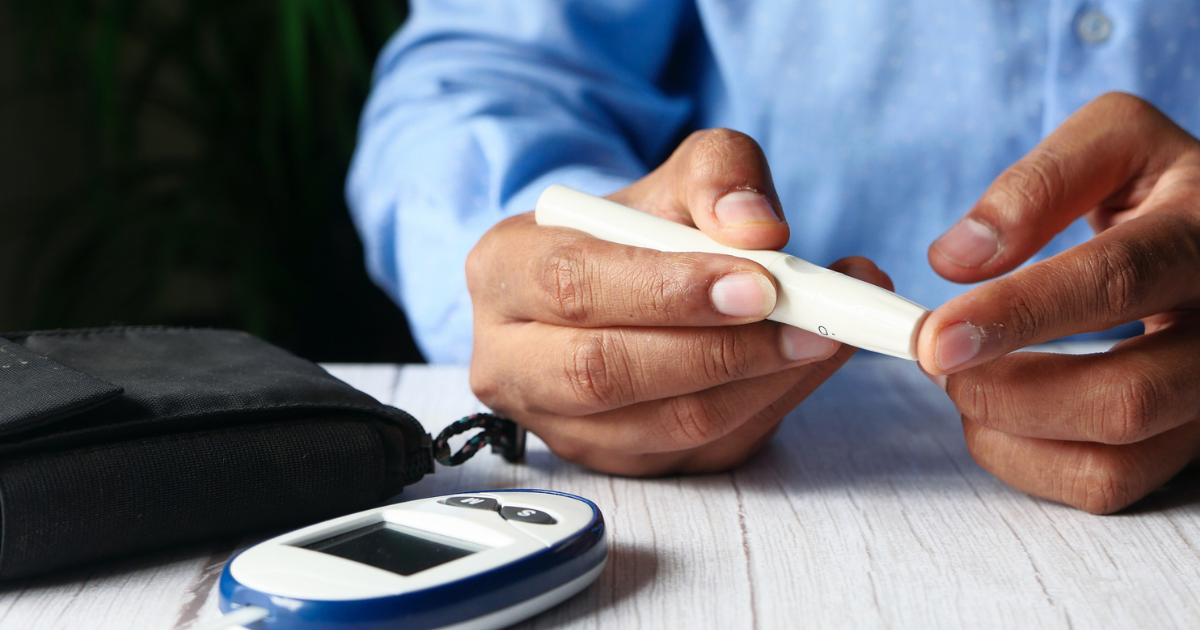By Angela Thompson, DNP, FNP‐C, BC‐ADM, CDCES, FAANP
One of the fundamental skills in diabetes management is problem-solving as it relates to acute illness, or sick day management. This includes understanding the recommended adjustments in glucose monitoring, diabetes medications and diet, as well as controlling acute illness symptoms and knowing when to contact your health care provider or diabetes specialist for additional guidance.
Adjustments to Glucose Monitoring
Self-monitoring of glucose levels is critical during an acute illness because it will give you the information required to determine whether changes are needed in food and medication intake, in addition to helping you evaluate the effectiveness of those changes. Checking glucose levels with your blood glucose monitor or glucose sensor at least every three to four hours is the minimum suggested interval.
Urine ketone testing should be added if glucose levels are consistently over 250 mg/dl or if vomiting occurs. Ketone strips are available at the local pharmacy and do not require a prescription. A by-product of fat metabolism, ketones are produced when there is minimal glucose entering the cells, causing the body to break down fat for caloric needs. The metabolism of fat cells can be dangerous in large amounts, since ketones are acidic. Ketosis occurs when ketones are found in the urine and may be a sign of stress, infection, dehydration or lack of adequate insulin. A trace, or small amount, of ketones can often be treated with adequate hydration and caloric intake. Any higher amounts need to be discussed with your nurse practitioner (NP) or other health care provider for further guidance, because ketosis can be a life-threatening condition and may cause multiple organ dysfunction.
Adjustments to Diabetes Medications
Most medications to treat diabetes should be continued during an acute illness. The only exception is if you are nauseated and unable to eat or have ketones present in your urine. In this scenario, it is possible you may not need insulin for meals or medications like glipizide, glimepiride or glyburide. These medications can increase the risk for hypoglycemia, or low blood sugar. You would still need other diabetes medications, including long-acting insulin and short-acting insulin to correct any increases in your glucose levels above your target range.
Stopping long-acting insulin or all diabetes medications with acute illness is a common mistake that leads to hospital admission for hyperglycemia in the form of diabetic ketoacidosis (DKA) or hyperglycemia hyperosmolar state (HHS). DKA and HHS account for an estimated 65.72% of hospitalizations for Type 1 diabetes and 35.28% for Type 2 diabetes.
If you have an acute illness, you also want to make sure that you are able to maintain adequate fluid intake (8-16 ounces per hour) with soups, broth, water or low to no caloric beverages (including some electrolyte replacement beverages) to prevent dehydration and ketosis. If your glucose levels are lower than 200 mg/dl, then consuming regular caloric liquids or a soft diet is recommended to prevent hypoglycemia from occurring. Soft diets consist of foods that are unlikely to cause stomach upset and are easy to chew and swallow. These foods may be chopped, ground, mashed or pureed.
Controlling Symptoms With Non-prescription Medications
General — When available, choose products for symptom relief that do not contain alcohol or sugar. A general rule of thumb is to select gel or tablet forms since they are unlikely to contain carbohydrates or alcohol, which affect glucose levels. If you prefer a liquid, check the manufacture’s website for details on ingredients or call the toll-free consumer number on the package.
Cold or Cough —To reduce the risk of medication interactions and side effects, consider a product that treats your main symptom, rather than a product for multiple symptoms. Nasal sprays for allergies or nasal congestion are absorbed locally, so they are generally safe to take.
Pain and Fever — Acetaminophen is the safest product to treat these symptoms. Avoid products containing aspirin, ibuprofen and naproxen unless your health care provider has specifically indicated these medications are safe for you.
Gastrointestinal Upset
Most nonprescription medications for diarrhea, abdominal cramps, as, constipation, heartburn and upset stomach are unlikely to impact glucose levels since they rarely contain alcohol or carbohydrates.
- Antacids are safe to treat stomach upset or heartburn, as long as they do not contain aluminum. Products containing aluminum can cause constipation and are unsafe to use if you have kidney disease.
- Products to treat constipation include osmotic laxatives (glycerin, polycarbon glycol 3350), bulk forming laxatives (psyllium, polycarbophil), stimulant laxatives (bisacodyl, senna, castor oil) or saline laxatives (magnesium citrate, sodium phosphate, magnesium phosphate) and stool softeners. Although these products do no do not change glucose levels, stimulant, osmotic and saline laxatives should be used with caution since they can lead to electrolyte imbalances. Care should also be taken not to use these products for more than one week.
- Products to treat diarrhea that do not impact glucose levels include loperamide and bismuth subsalicylate. Bismuth subsalicylate can possibly interact with aspirin, ibuprofen, naproxen, antiplatelets and other anticoagulants, so be sure to discuss the safety of this product with your health care provider if you are using one of these medications.
When to Contact Your Health Care Provider
The following symptoms should be reported to the clinician managing your diabetes:
- Moderate or large ketones in the urine.
- Vomiting more than once daily.
- Diarrhea more than five times in a day.
- Abdominal pain.
- Irregular breathing or breath that has a fruity odor.
- An altered level of consciousness or confusion.
- Fever greater than 102.5° F.
- Glucose levels over 250 ml/dl for more than one day.
Managing your diabetes doesn’t have to be difficult. With proper care — particularly when you feel sick — you can achieve a healthier lifestyle. Contact your NP or other health care provider if you have questions or concerns about managing your diabetes.

